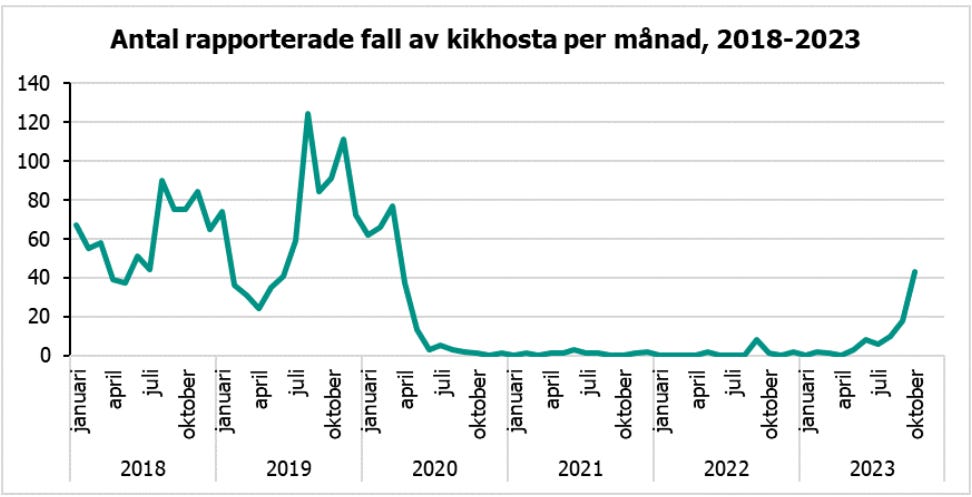Sweden reports increase in whooping cough
The Public Health Agency of Sweden, or Folkhalsomyndigheten, reports an increase in whooping cough, or pertussis in the country this year.
In recent years, the number of reported cases of whooping cough has been at a low level. A significant decline occurred in the spring of 2020, which is assumed to be due to the fact that the spread of infection decreased as a result of the infection control measures during the covid-19 pandemic.
In 2021 and 2022, only 11 and 13 cases of whooping cough were reported respectively.
The statistics for the year 2023 now show that cases are increasing, which means that whooping cough is circulating in society again. In October, 43 cases were reported nationally, four of the cases were children under one year old. A total of 91 cases of whooping cough have been reported in 2023.
Whooping cough is a highly contagious respiratory infection that causes a long-lasting and troublesome cough. For young children, whooping cough can be a very serious and sometimes life-threatening illness.
Vaccination
Vaccination against whooping cough has been included in the vaccination program for children since the 1950s. Vaccination during pregnancy is recommended starting in 2022 to offer protection for the youngest children, who are too young for vaccination. When the pregnant woman is vaccinated, antibodies against whooping cough are formed which give the child protection against whooping cough during the child's first months of life.
Vaccine against whooping cough is available in the following combination vaccines:
Diphtheria-tetanus-whooping cough-polio-Hib-hepatitis B
Diphtheria-tetanus-whooping cough-polio (both childhood vaccine and booster vaccine with reduced antigen content)
Diphtheria-tetanus-pertussis (booster vaccine with reduced antigen content)
A pertussis vaccine alone is not currently available.
Vaccination is recommended for pregnant women:
to pregnant women after the 16th week of pregnancy. The vaccine must be given in good time before the expected birth
The vaccination is given in the form of a combination vaccine against tetanus, diphtheria and whooping cough
The vaccination is part of the general vaccination program for children and is given at the following ages:
at 3 months, 5 months and at 12 months
at 5 years
in grades 8-9
In the current vaccination program for children, the pertussis vaccine is given together with the other vaccinations recommended at 3, 5 and 12 months of age. Top-up doses at age 5 and in grades 8-9 are given together with vaccines against diphtheria and tetanus (at age 5 in combination with polio vaccine). Children born up to and including 2001 followed previous vaccination programs and received their fourth vaccination at age 10.
If whooping cough is suspected in an infant, prompt treatment is important to reduce the risk of serious illness. Even infants who are suspected of having been exposed to infection may be eligible for treatment, even if the infant does not yet have symptoms. Pregnant women and family members with a long-term cough should also be tested and treated if they have whooping cough to reduce the risk of the baby becoming infected after birth.





